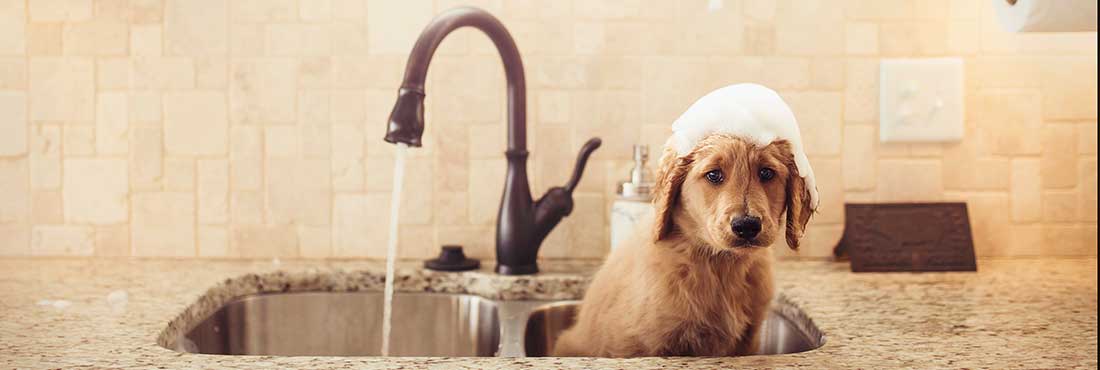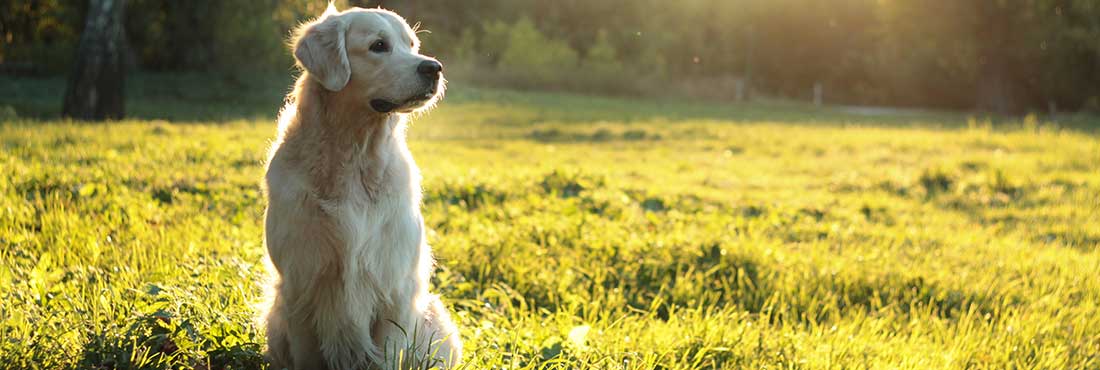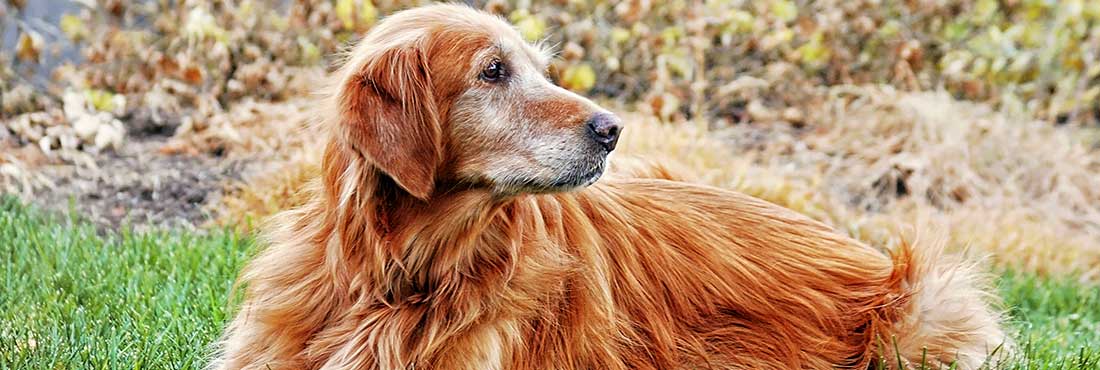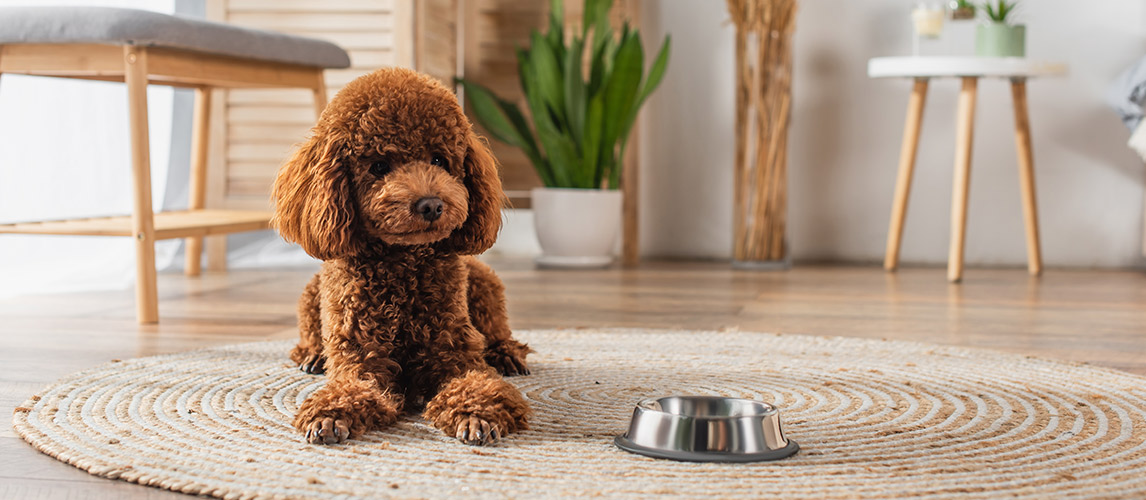Having a dog is one of the best things in life. But some people feel unable to welcome a canine into their home because they suffer from allergies. This is where crossbreeds such as the Goldendoodle often come in.
As a ‘designer breed’, the Goldendoodle is a cross between the Golden Retriever and the Poodle. And, as the Poodle is renowned for its low shedding, it makes sense to assume the Goldendoodle is too. This is potentially good news for allergy sufferers.
But are Goldendoodles truly hypoallergenic dogs? We dig a little deeper into this gorgeous mixed breed to find out.
Why are Some People Allergic to Dogs?
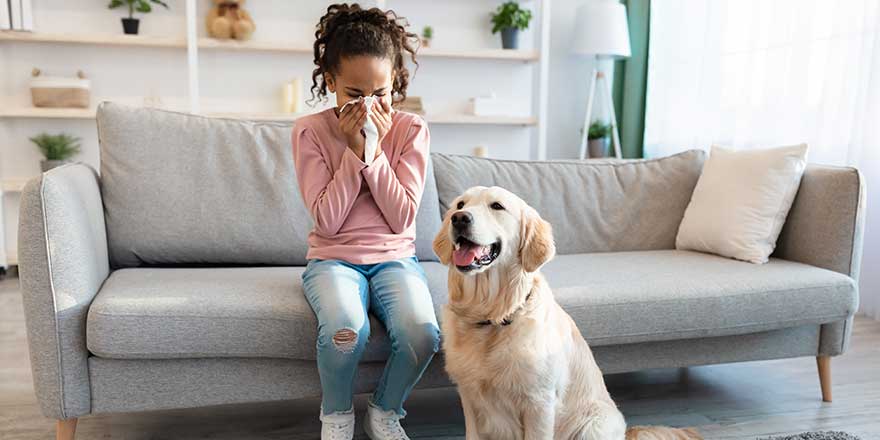
It is not unusual to have an allergy, whether hay fever, environmental allergies, or sensitivities to chemicals in products such as skincare. And the pets you may have in your home can also be an allergy trigger. It is estimated that 10% to 20% of the world’s population suffers from dog allergies. And this can include more severe allergies.
When it comes to being allergic to dogs, it’s easy to assume that the canine’s fur triggers an allergic response such as watery eyes, rashes, or sneezes. This may make many conclude that long-haired or fluffy pooches are best avoided. It is not a dog’s fur that is the allergen culprit, but proteins that can be found in your dog’s saliva, skin, and even pee. So, even if you have a very short-haired or completely hairless dog, it is still possible to be allergic to them.
Dander can be particularly bad for pet-allergy-prone people. Dogs produce dander, which is made up of dead skin cells which are not only found in dog hair and on their body but can also be airborne. This leads to dander also floating around your home, meaning it is easily inhaled and can trigger an allergic reaction.
However, researchers have also discovered that if you have dog allergies, you could be more sensitive to certain dog breeds than others. And this can be good news if you have your heart set on becoming a pooch parent.
The Lowdown on the Goldendoodle
One of the popular ‘Doodle’ mixes, Goldendoodles started to gain prominence as a family pet in the 1990s, thanks to their gorgeous looks, range of sizes, and gentle, friendly temperament. Their energy levels mean the golden doodle is also good for active families. And the fact that the Goldendoodle was promoted as ‘low shedding’ was a bonus, attracting the attention of people looking for a minimal allergy dog.
However, just like all the other Doodles, the Goldendoodle is not a pure breed and is still considered a mixed breed and not formally recognized by the American Kennel Club.
The Goldendoodle’s reputation as a hypoallergenic dog is down to the genetics of its parents, the purebred Golden Retriever and the purebred Poodle.
The Golden Retriever
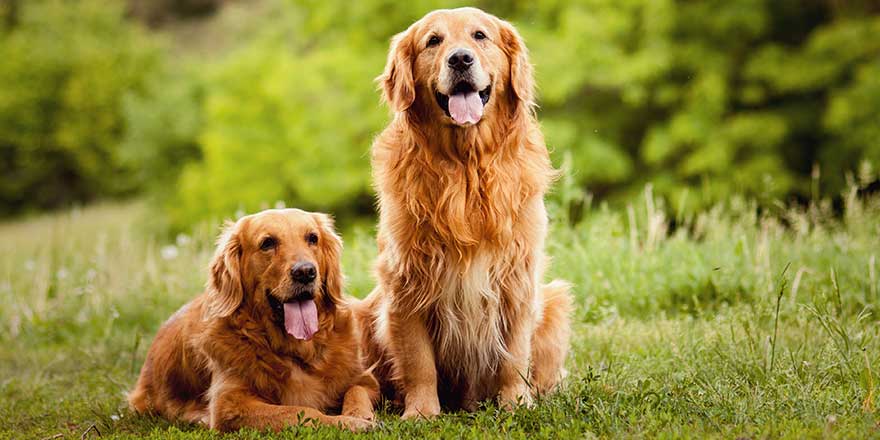
One of the US’s most popular pet dogs, the Golden Retriever is the ultimate all-rounder. The Retriever, a medium to a large-sized dog, is friendly, affectionate, tolerant, and intelligent, making them easy to train. However, they are high-energy and need plenty of exercise and mental stimulation.
The Retriever’s coat is medium length and is an all-year-round shedder. Health-wise, Golden Retrievers can be prone to seasonal allergies, eye issues, and hip dysplasia.
The Poodle
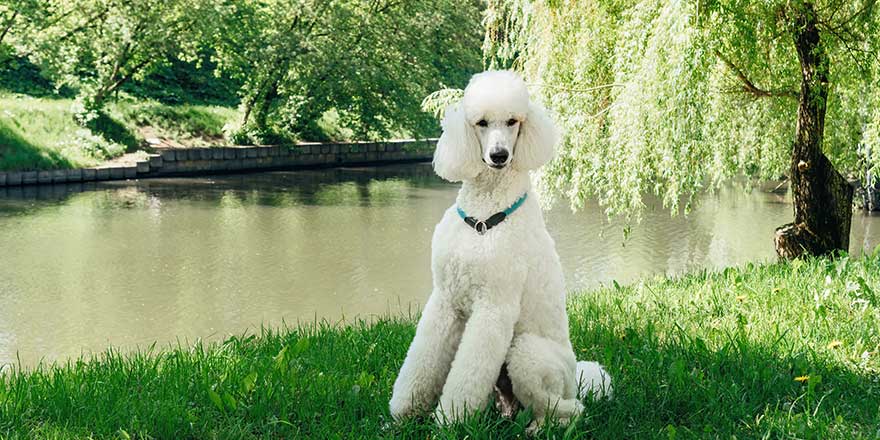
Another intelligent and highly trainable breed, the Poodle comes in three sizes: toy, miniature, and standard. And despite their aloof appearance, the poodle is a surprisingly playful, even mischievous pure breed.
The Poodle brings the potential for the Goldendoodle to be good for allergy sufferers thanks to their dense, textured single coat, low shedding, and low dander accumulation. The Poodle is a generally healthy dog, although they can be susceptible to some health issues, including epilepsy, ear infections, and hip dysplasia.
It is important to note that not all Goldendoodles are the same, as the Goldendoodle puppy can take on some or all of its parents’ characteristics. And some of these characteristics can dominate more than others.
Are Goldendoodles Hypoallergenic?
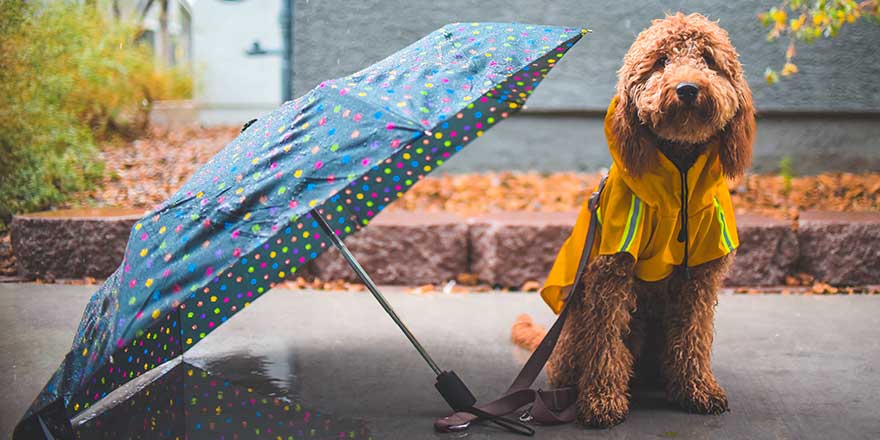
So, now we know a little more about the parentage of the Goldendoodle, we can turn our attention to the burning question – are Goldendoodles hypoallergenic?
Something described as ‘hypoallergenic’ can still have the potential to cause an allergic reaction, but any response will be significantly less severe. And the bad news for wannabe pet owners who suffer from pet allergies is that there is no such thing as a dog breed that can be described as 100% hypoallergenic. And this includes Goldendoodles.
However, all is not lost as, thanks to their Poodle genes, the Goldendoodle is low shed and dander. And while it is still possible to be allergic to Goldendoodle pets, this puts the breed – along with other ‘Doodles’ such as the Labradoodle – into the category of being less likely to trigger an allergy than many other dog breeds.
Can You Be Allergic to a Goldendoodle?
The simple answer is yes. As we have already seen, there is no such thing as a completely hypoallergenic dog.
While the Goldendoodle is less likely to trigger an allergic reaction, it still has the potential to cause issues if you have a pet allergy. And, as the Goldendoodle is a crossbreed, there are differences in each dog, meaning some Goldendoodles are more ‘allergy friendly’ than others.
How Much do Goldendoodles Shed?
Regarding allergies, most Goldendoodles have the edge over many other breeds because they are low shedders. They are not shed-free, however; the amount of hair shed will vary from dog to dog, depending on whether the golden retriever or poodle genes are more dominant.
Factors that can influence the level of shedding in a Goldendoodle include:
- Coat Type – Goldendoodles come with one of three coat types – curly, wavy, and straight. Curly or wavy Goldens are generally light shedders, whereas a straight-coated Goldendoodle will shed much more. Goldendoodles are all-year-round shedders, whatever their coat type, rather than having a twice-yearly seasonal coat ‘blow’.
- Dog Size – As Poodles come in three sizes (toy, miniature, and standard), you can get Goldendoodles in different sizes too, typically miniature or standard, although you can get large Goldens too. Standard or large Goldendoodles tend to be the heaviest shedders, especially if they have a straight coat. A mini Goldendoodle is likely to shed less than the larger dogs.
- Their Generation- The breed generation can also influence the level of shedding in an individual Goldendoodle. First generation – also known as F1 – Goldendoodles are more susceptible to the genetics of their purebred parents. So, if the genes of the Golden Retriever parent are more dominant than the poodle in an F1 Goldendoodle, they are more likely to be heavier shedders.
However, an F1b Goldendoodle – a puppy resulting from an existing Doodle breeding with another purebred Poodle will be a much lighter shedder. And this is because the Goldendoodle puppy will have around 75% Poodle in their genes. A multi-generation Goldendoodle will also shed less.
Picking the Ideal Goldendoodle Combination
With their coat type and breed generation figuring in how seriously – or not – a Goldendoodle may shed, you can opt for the furry friend that best fits your ‘hypoallergenic’ needs.
As a rule of thumb, you will find that the Goldendoodles most likely to shed are straight-coated F1 Goldendoodles, followed by straight-coated F1b types. Meanwhile, F1b Goldendoodles with a curly coat or curly-coated multigenerational Goldendoodles are most likely to be the lightest shedders, so a good choice if you suffer from pet allergies. But it is important that whatever Goldendoodle combination you choose, you always buy from a reputable breeder.
Ways to Reduce Shedding in a Goldendoodle
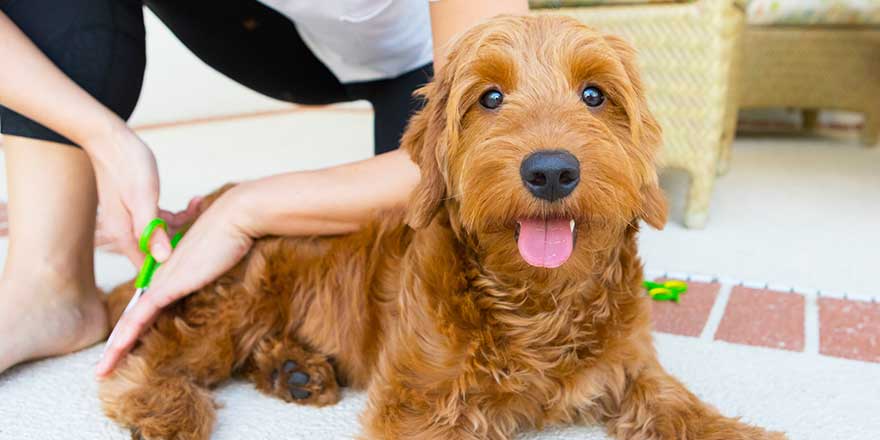
Regardless of the size, your dog’s coat type, or generation of your Goldendoodle, your new pet will shed to some extent. And some things can increase the amount of dog fur they lose. So, knowing the causes of excess hair loss and how to reduce the amount of shedding can help your Goldendoodle become more ‘hypoallergenic’.
Key triggers for excess Goldendoodle shedding include:
- Seasonal Shedding: Thanks to their retriever gene heritage, many Goldendoodles will have a double coat, originally designed to insulate the dog. With the seasonal changes of spring and fall, this undercoat will be shed to make room for a fresh new undercoat. And at these times of the year, you can expect more fur and dander around your home. Regular grooming throughout the year can help these seasonal transitions.
- Stress: With both parent breeds being family-loving and super-intelligent, the Goldendoodle can be prone to separation anxiety. They can also find some situations stressful, all of which can induce excess shedding.
- Allergies and Skin Problems: Skin issues and allergies are not unknown in Goldendoodles, with dermatitis a common condition. With dermatitis, a dog will shed more and create more dander, all irritants for the allergy-prone pet owner.
- Excessive Bathing: Considered a pup with higher energy levels, the Goldendoodle thrives on plenty of outdoor exercise and play. Which means they could find themselves getting down and dirty frequently. But over-bathing your Goldie or using harsh shampoos can irritate them, leading to skin issues and excess shedding.
How to Manage Your Pet Allergy
As the 100% hypoallergenic Goldendoodle simply doesn’t exist, opting for a dog if you suffer from pet allergies needs careful consideration. And this includes how you can manage your allergies and the unpleasant symptoms and choose a low-shedding breed.
If you suffer serious reactions to pet fur, you should always consult a doctor before getting a dog, even if it is a low shedder such as the Goldendoodle. But for less serious to mild allergies, you can experience the joy of dog ownership if you use a few strategies to keep those allergic symptoms under control.
With the following, you aim to reduce the number of allergens released from your dog’s fur and minimize any pet dander.
Daily Brushing
Keeping on top of all that lovely fur is the first step to reducing the allergy potential of your Goldendoodle. And this includes daily brushing to remove loose fur in a controlled way and keep their coat in tip-top condition.
If your Goldendoodle has a thick double coat, it is also a good idea to invest in a de-shedder tool, which helps to rake out the loose underlayer before it can cause too much trouble.
Use a Professional Groomer
Regular appointments with a professional dog groomer are also beneficial, as they can reduce the amount of home grooming you need. Many Goldendoodle owners opt for clipping their doggo every few weeks, which keeps them mat-free and neat and can reduce the amount of fur regularly shed around your home.
Keep Your Pet off the Furniture
It is always a good idea to train a Goldendoodle puppy to stay off your furniture, especially where you normally sit and sleep. This will keep all that excess fur away from you as much as possible. And get into the habit of vacuuming the home daily to suck up shed hair and dander.
Maintain Good Hygiene
Never let your Goldendoodle lick your face or hands, as dog saliva is also known to trigger an allergic reaction in some people. And always wash your hands after handling or petting your pooch.
Diet and Supplements
Your Goldendoodle needs a high-quality and appropriately balanced nutritious diet to maintain his health, including a healthy coat and skin. Also, look for added supplements such as omega 3 and 6, which can boost his fur and skin condition.
Is the Goldendoodle the Pet for You?
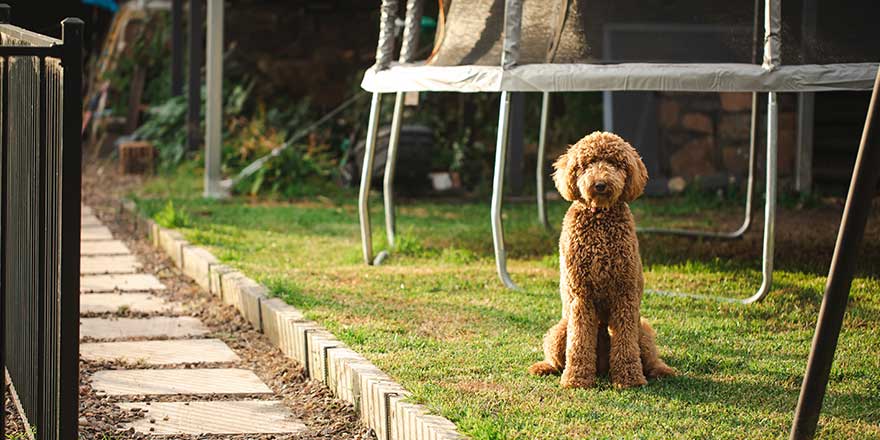
So, there you have it – while the Goldendoodle is not strictly a hypoallergenic dog, it can make a good breed if you suffer from pet allergies. But you do need to choose your Goldendoodle carefully as its genetics, coat type, and size can all influence how much your new pet will shed. And you need to also take the severity of your pet allergy into account.
But, if you have your allergies under control, with a little careful home management to minimize your exposure to allergens, there’s every possibility that the Goldendoodle could become your low-shedding canine best friend.


